Revision module B Grammar&Speaking 课件 (共37张PPT)外研版八年级英语上册
文档属性
| 名称 | Revision module B Grammar&Speaking 课件 (共37张PPT)外研版八年级英语上册 |
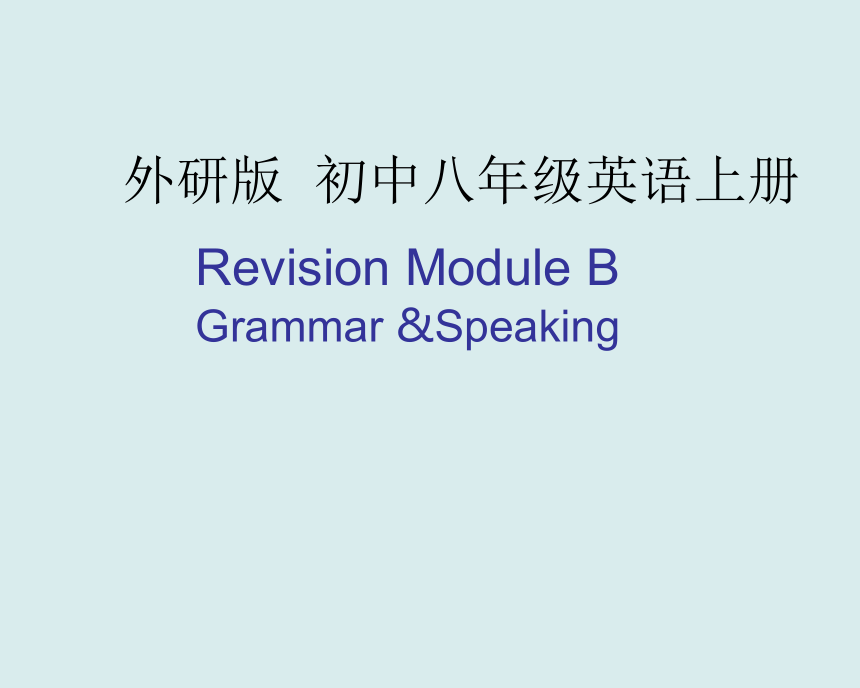
|
|
| 格式 | pptx | ||
| 文件大小 | 970.6KB | ||
| 资源类型 | 教案 | ||
| 版本资源 | 外研版 | ||
| 科目 | 英语 | ||
| 更新时间 | 2024-12-12 20:51:05 | ||
图片预览

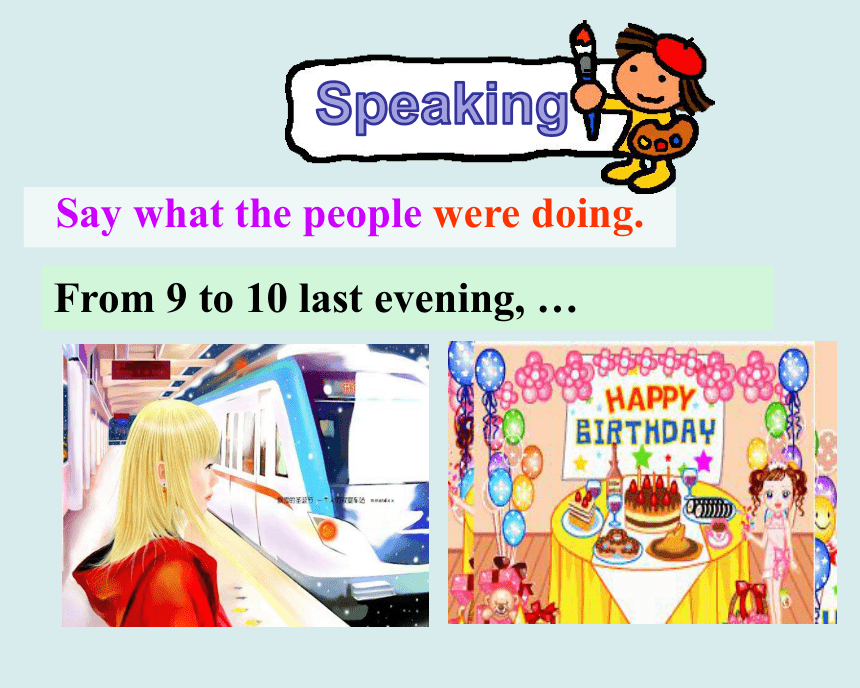
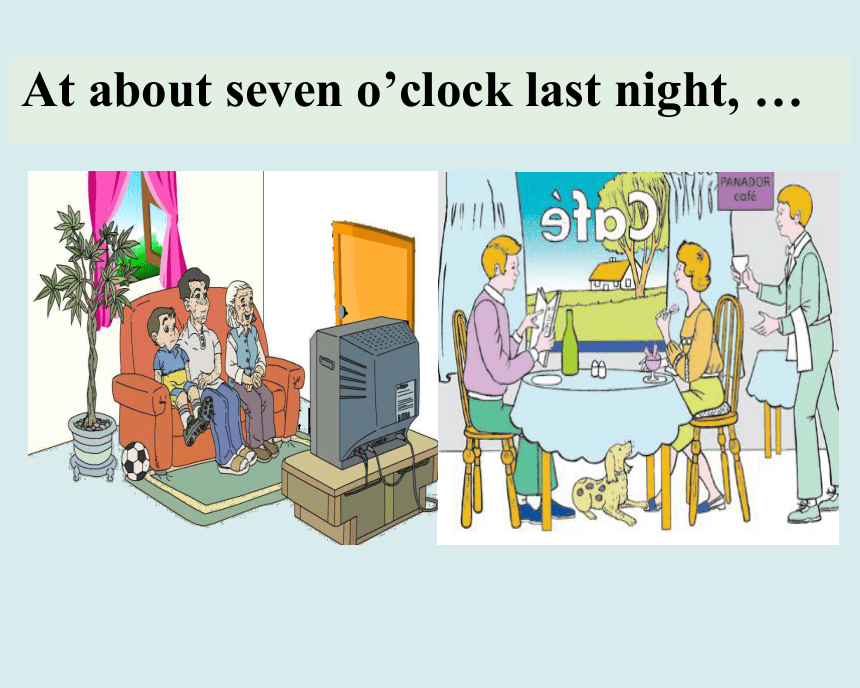
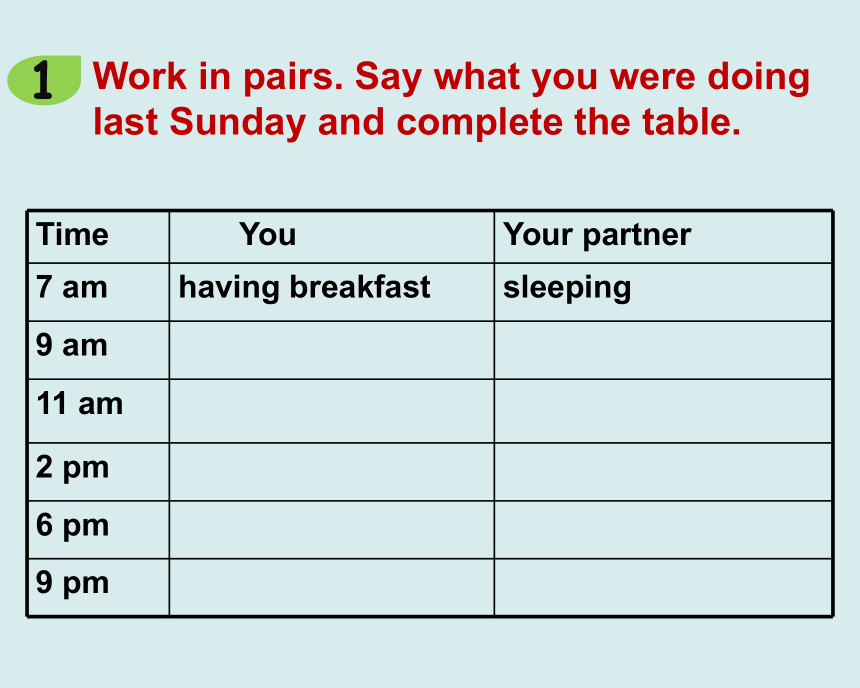
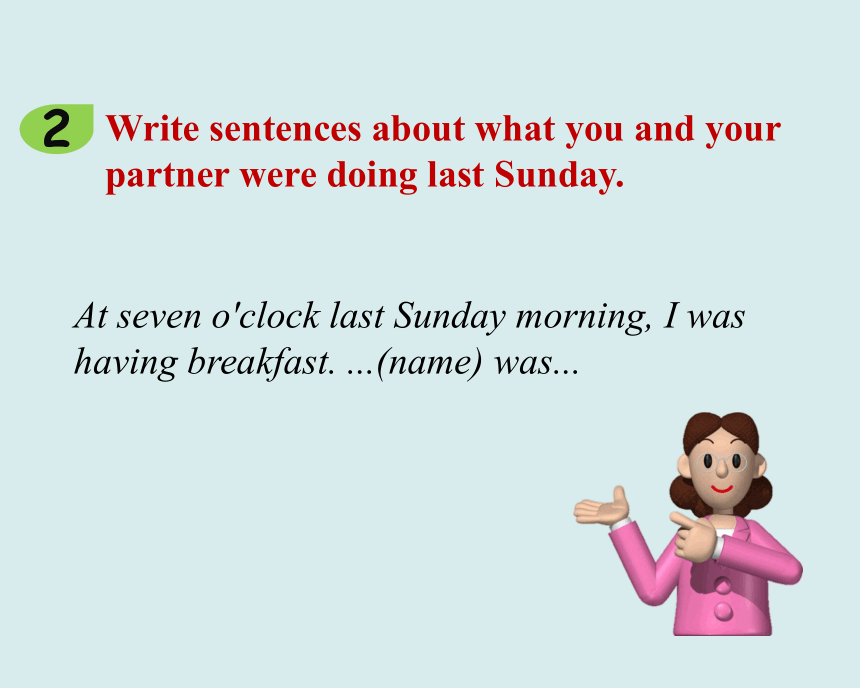

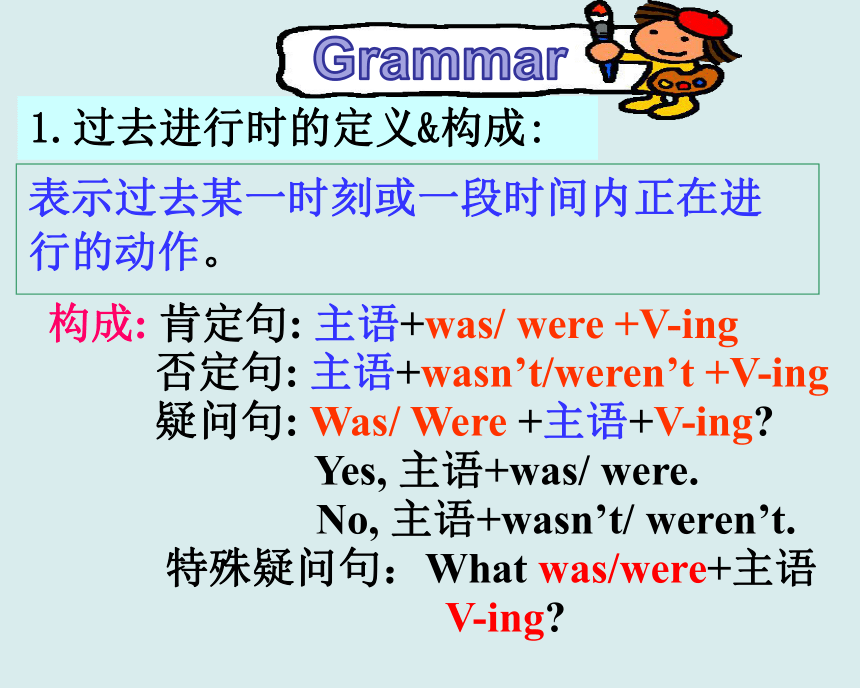

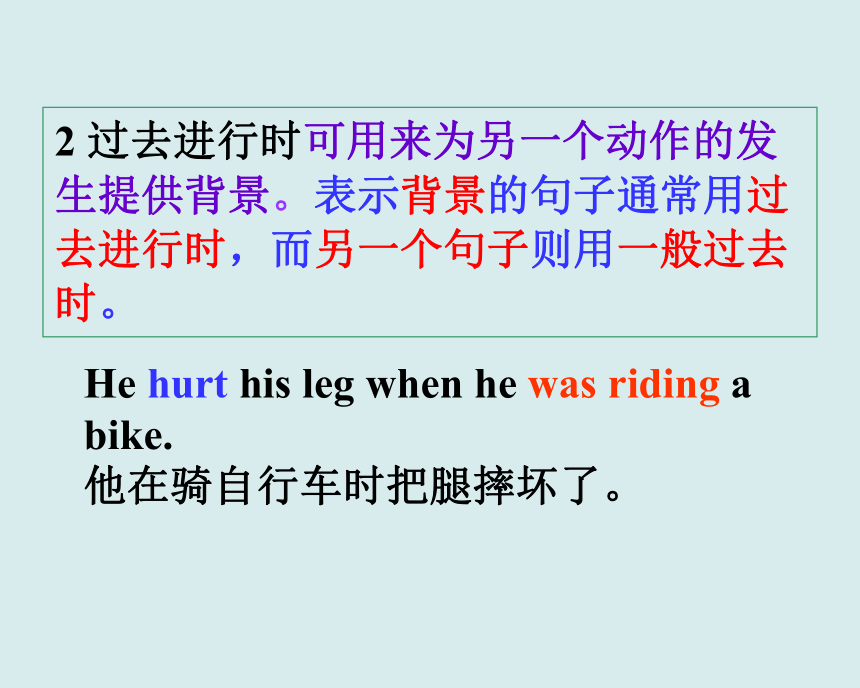
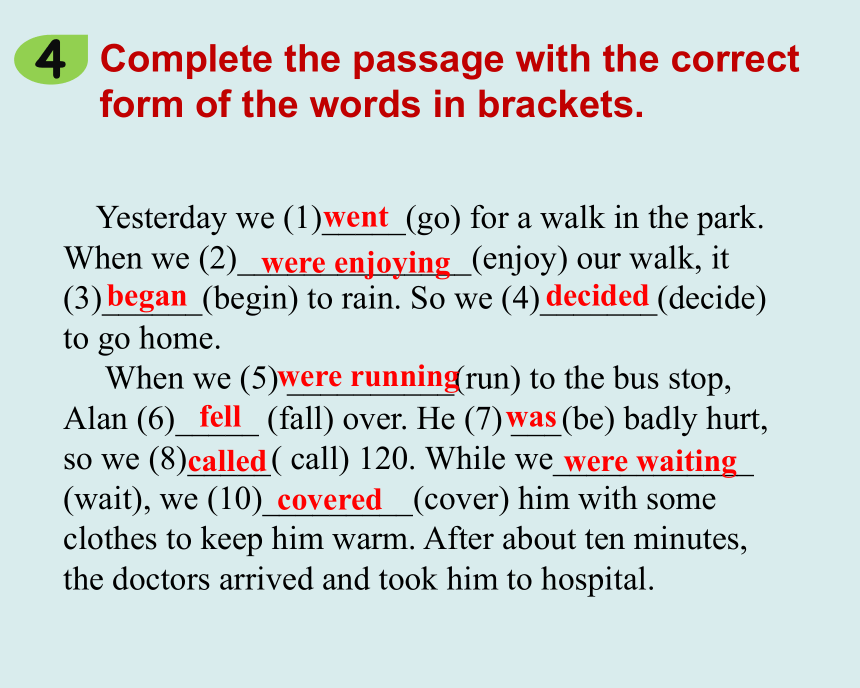

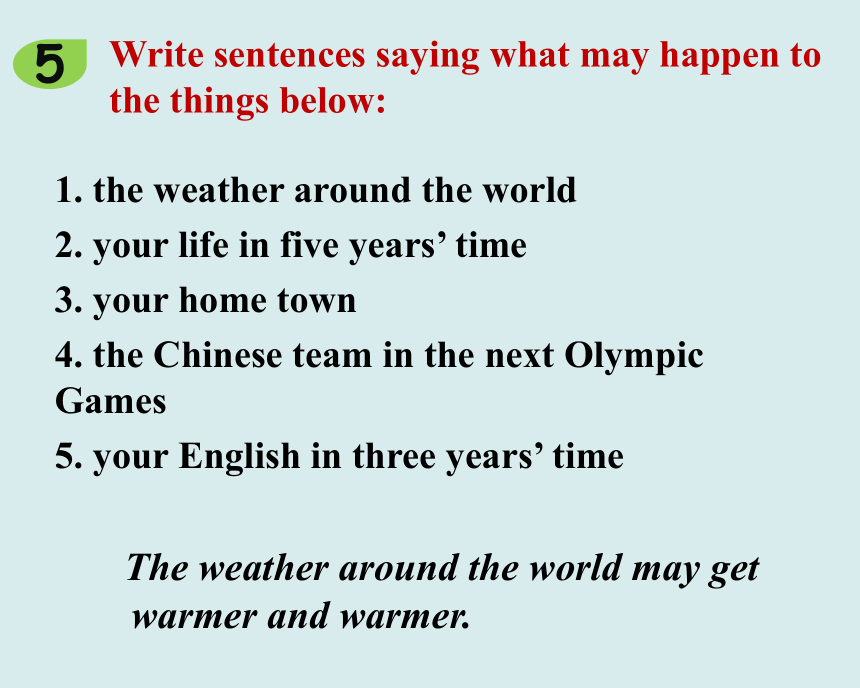
文档简介
(共37张PPT)
外研版 初中八年级英语上册
Revision Module B
Grammar &Speaking
Say what the people were doing.
From 9 to 10 last evening, …
Speaking
单击此处编辑母版文本样式
第二级
第三级
第四级
第五级
At about seven o’clock last night, …
Work in pairs. Say what you were doing last Sunday and complete the table.
Time You Your partner
7 am having breakfast sleeping
9 am
11 am
2 pm
6 pm
9 pm
1
Write sentences about what you and your partner were doing last Sunday.
At seven o'clock last Sunday morning, I was having breakfast. ...(name) was...
2
Work with another student. Ask and answer questions about what you guys were doing last Sunday.
A: What were you doing at seven o’clock last Sunday morning
B: I was having breakfast.
A: What was your partner doing at seven o’clock last Sunday morning
B: He /She was sleeping.
A: Were you having dinner at nine o’clock last Sunday evening
B: No, I wasn’t. I was ….
3
表示过去某一时刻或一段时间内正在进
行的动作。
1.过去进行时的定义&构成:
构成: 肯定句: 主语+was/ were +V-ing
否定句: 主语+wasn’t/weren’t +V-ing
疑问句: Was/ Were +主语+V-ing
Yes, 主语+was/ were.
No, 主语+wasn’t/ weren’t.
特殊疑问句:What was/were+主语
V-ing
Grammar
1) 过去进行时表示过去某时间正在进行
的动作或持续的行为,常和表过去的时
间状语连用。
2)时间标志:
at …o'clock yesterday morning
at that time
from nine to ten last evening
when, while
2. 过去进行时的基本用法:
2 过去进行时可用来为另一个动作的发
生提供背景。表示背景的句子通常用过
去进行时,而另一个句子则用一般过去
时。
He hurt his leg when he was riding a
bike.
他在骑自行车时把腿摔坏了。
Yesterday we (1)_____(go) for a walk in the park. When we (2)______________(enjoy) our walk, it (3)______(begin) to rain. So we (4)_______(decide) to go home.
When we (5) __________(run) to the bus stop, Alan (6)_____ (fall) over. He (7) ___(be) badly hurt, so we (8)_____( call) 120. While we____________ (wait), we (10)_________(cover) him with some clothes to keep him warm. After about ten minutes, the doctors arrived and took him to hospital.
Complete the passage with the correct form of the words in brackets.
went
were enjoying
began
decided
were running
fell
was
called
were waiting
covered
4
3.一般过去时和过去进行时的区别:
He read a book last night.
昨天晚上他读了一本书。(读完了)
He was reading a story book last night.
昨天晚上他正在读故事书。(还没有读完)
一般过去时 过去进行时
相同点 表示过去发生的动作
不同点
表示过去的时间里发生的动作,往往已经完成
表示过去某一时刻或时段正在进行的动作
Write sentences saying what may happen to the things below:
1. the weather around the world
2. your life in five years’ time
3. your home town
4. the Chinese team in the next Olympic Games
5. your English in three years’ time
The weather around the world may get warmer and warmer.
5
Bring a map because you may want to travel around.
带张地图,因为你可能想四处转转。
当我们想表达可能发生某事以及某人可能做某事时,可以用 may/might 表示。例如:
情态动词 may/might
Take your swimming clothes because you might want to go swimming in the sea.
带上游泳衣吧,说不定你想到海里游泳呢。
Grammar
其他表达可能的常用结构:
It is possible to do sth.
It is possible that ...
主语 + will probably/possibly + v.
例如:
Is it possible to visit Alaska in December
12 月份去阿拉斯加旅游有可能吗?
1.the weather around the world
2. your life in five years’ time
3. your home town
The weather around the world may get warmer and warmer.
I may be at university in five years’ time.
The town where I live might become bigger.
4. the Chinese team in the next Olympic Games
5. your English in three years’ time
The Chinese team will probably win in the next Olympic Games.
My English may be better in three years’ time.
must 的用法
表示主观的义务和必要,主要用于肯定句和疑问句,意思为 “必须……”;must的否定形式mustn’t表示禁止,意思是“不能,不许”。
Grammar
must的一般疑问句的构成及其回答:
— Must I come before 6:30 tomorrow
明天我必须在六点半之前来吗?
— Yes, you must.
是的,你必须在那之前到。(表示一定要)
— No, you needn’t.
不,你不必在那之前来。(表示没必要,相当于 You don’t have to.)
2) 表示肯定的猜测,常用于肯定句中,
意为 “一定是,必然……”。
e.g. Your sister must be a doctor in this hospital. ( 现在的猜测 )
你的妹妹现在一定在这家医院当医生。
need的用法
need 作情态动词表示“需要”,否定形式 need not(needn’t),表示“不需要”或“不必要”。例如:
If she wants anything, she need only ask.
如果她要什么,说一下就行了。
You needn’t wait.
你不必等待。
need 的一般疑问句的构成及其回答:
— Need I report it to the police
我要向警方报告这件事吗?
— Yes, you must.
是的,你必须报告。(表示必须做)
— No, you needn’t.
不,没必要。(表示没必要)
can 的用法
1) 表示能力
e.g. I can’t swim. 我不会游泳。
Can you drive? 你会开车吗?
2) 表示可能性,意思是:可以,可能。
e.g. He can be very friendly at times.
他有时可能非常友善。
3) 表示允诺,意思是:可以,能够。
e.g. Can I use your pen
我能用下你的笔吗?
4) 表示惊异、不相信、猜测等(用于疑问句、否定句或感叹句中),意思是:会,可能。
e.g. This can’t be true.
这不可能是真的。
Can it be true?
这能成真吗?
Complete the conversations with the correct form of the words in the box.
1.--_____you leave
-- Yes, it’s getting late.
2.– Shall I help you
--No, you ______. I can do it by myself.
3.—Do you want this book
-- Yes, I ____ to use it this afternoon.
Could might must mustn’t need needn’t
Must
needn’t
need
6
4. – Have you got some free time
-- I ____________ have some later.
5. --_____ you help me with my homework
-- Yes, after I finish mine, I’ll help you.
6. –Be quiet ! You _______ talk in the library.
-- Oh, sorry!
might / could
Could
mustn’t
Complete the sentences with must, mustn’t, can or can’t.
1.Don’t open your present now! In China, you ____ wait and open it later.
2. –Can I clean the house on the first day of the Spring Festival
-- No, you _____________. It’s bad luck.
3. In America, you ____ open your present immediately. You don’t have to wait!
4. In Australia, you _______________drive on the right. It’s against the law.
5.In Britain, you _____ be seventeen or over to drive a car.
must
can’t / mustn’t
can
can’t / mustn’t
must
7
祈使句
祈使句表达说话人对对方的叮嘱、劝告、希望、禁止、建议、请求或命令等。祈使句一般以动词原形开头,无时态和数的变化。常见的句型如下:
1.动词原形构成的祈使句
2.let’s构成的祈使句
3.无动词祈使句
Grammar
1. 动词原形构成的祈使句
此类祈使句暗含的主语是you,但通常省略。否定句往往由 do not(don’t)或 never 开头。例如:
Have a nice day!
祝你度过美好的一天!
Don’t waste your time!
别浪费时间了!
Never be late again!
再也不要迟到了!
2. let’s 构成的祈使句
这类祈使句往往用于提出建议。例如:
Let’s spend this weekend in the countryside.
这周咱们到乡下度周末吧。
3. 无动词祈使句
在请求、命令和口号中,常用无动词祈使句,它实际上是省略了动词,从而使语句更简洁有力。例如:
Just a minute, please!
请稍等!
This way, please!
请这边走!
Make a list of what you should and shouldn’t do in a fire.
1. Do not use the lift.
2. Phone 119 for help.
3. ……
8
If your clothes are on fire, drop to the ground and roll.
Cover your nose and mouth with a
wet cloth if there’s smoke.
Do not use the lift
Phone 119 for help.
Make a list of what you should and shouldn’t do in a fire.
1. Do not use the lift.
2. Phone 119 for help.
3. Cover your nose and mouth with a wet cloth if there’s smoke.
4. Tell people to leave the building.
5. If your clothes are on fire, drop to the ground and roll.
6. Do not go back into a burning building.
8
Homework
Making a poster in groups . 以小组的形式选择一个话题进行海报的制作,内容如下:
1.Preventing (预防) accidents at school using must/mustn’t
2.what to do in an earthquake.
3.School rules
外研版 初中八年级英语上册
Revision Module B
Grammar &Speaking
Say what the people were doing.
From 9 to 10 last evening, …
Speaking
单击此处编辑母版文本样式
第二级
第三级
第四级
第五级
At about seven o’clock last night, …
Work in pairs. Say what you were doing last Sunday and complete the table.
Time You Your partner
7 am having breakfast sleeping
9 am
11 am
2 pm
6 pm
9 pm
1
Write sentences about what you and your partner were doing last Sunday.
At seven o'clock last Sunday morning, I was having breakfast. ...(name) was...
2
Work with another student. Ask and answer questions about what you guys were doing last Sunday.
A: What were you doing at seven o’clock last Sunday morning
B: I was having breakfast.
A: What was your partner doing at seven o’clock last Sunday morning
B: He /She was sleeping.
A: Were you having dinner at nine o’clock last Sunday evening
B: No, I wasn’t. I was ….
3
表示过去某一时刻或一段时间内正在进
行的动作。
1.过去进行时的定义&构成:
构成: 肯定句: 主语+was/ were +V-ing
否定句: 主语+wasn’t/weren’t +V-ing
疑问句: Was/ Were +主语+V-ing
Yes, 主语+was/ were.
No, 主语+wasn’t/ weren’t.
特殊疑问句:What was/were+主语
V-ing
Grammar
1) 过去进行时表示过去某时间正在进行
的动作或持续的行为,常和表过去的时
间状语连用。
2)时间标志:
at …o'clock yesterday morning
at that time
from nine to ten last evening
when, while
2. 过去进行时的基本用法:
2 过去进行时可用来为另一个动作的发
生提供背景。表示背景的句子通常用过
去进行时,而另一个句子则用一般过去
时。
He hurt his leg when he was riding a
bike.
他在骑自行车时把腿摔坏了。
Yesterday we (1)_____(go) for a walk in the park. When we (2)______________(enjoy) our walk, it (3)______(begin) to rain. So we (4)_______(decide) to go home.
When we (5) __________(run) to the bus stop, Alan (6)_____ (fall) over. He (7) ___(be) badly hurt, so we (8)_____( call) 120. While we____________ (wait), we (10)_________(cover) him with some clothes to keep him warm. After about ten minutes, the doctors arrived and took him to hospital.
Complete the passage with the correct form of the words in brackets.
went
were enjoying
began
decided
were running
fell
was
called
were waiting
covered
4
3.一般过去时和过去进行时的区别:
He read a book last night.
昨天晚上他读了一本书。(读完了)
He was reading a story book last night.
昨天晚上他正在读故事书。(还没有读完)
一般过去时 过去进行时
相同点 表示过去发生的动作
不同点
表示过去的时间里发生的动作,往往已经完成
表示过去某一时刻或时段正在进行的动作
Write sentences saying what may happen to the things below:
1. the weather around the world
2. your life in five years’ time
3. your home town
4. the Chinese team in the next Olympic Games
5. your English in three years’ time
The weather around the world may get warmer and warmer.
5
Bring a map because you may want to travel around.
带张地图,因为你可能想四处转转。
当我们想表达可能发生某事以及某人可能做某事时,可以用 may/might 表示。例如:
情态动词 may/might
Take your swimming clothes because you might want to go swimming in the sea.
带上游泳衣吧,说不定你想到海里游泳呢。
Grammar
其他表达可能的常用结构:
It is possible to do sth.
It is possible that ...
主语 + will probably/possibly + v.
例如:
Is it possible to visit Alaska in December
12 月份去阿拉斯加旅游有可能吗?
1.the weather around the world
2. your life in five years’ time
3. your home town
The weather around the world may get warmer and warmer.
I may be at university in five years’ time.
The town where I live might become bigger.
4. the Chinese team in the next Olympic Games
5. your English in three years’ time
The Chinese team will probably win in the next Olympic Games.
My English may be better in three years’ time.
must 的用法
表示主观的义务和必要,主要用于肯定句和疑问句,意思为 “必须……”;must的否定形式mustn’t表示禁止,意思是“不能,不许”。
Grammar
must的一般疑问句的构成及其回答:
— Must I come before 6:30 tomorrow
明天我必须在六点半之前来吗?
— Yes, you must.
是的,你必须在那之前到。(表示一定要)
— No, you needn’t.
不,你不必在那之前来。(表示没必要,相当于 You don’t have to.)
2) 表示肯定的猜测,常用于肯定句中,
意为 “一定是,必然……”。
e.g. Your sister must be a doctor in this hospital. ( 现在的猜测 )
你的妹妹现在一定在这家医院当医生。
need的用法
need 作情态动词表示“需要”,否定形式 need not(needn’t),表示“不需要”或“不必要”。例如:
If she wants anything, she need only ask.
如果她要什么,说一下就行了。
You needn’t wait.
你不必等待。
need 的一般疑问句的构成及其回答:
— Need I report it to the police
我要向警方报告这件事吗?
— Yes, you must.
是的,你必须报告。(表示必须做)
— No, you needn’t.
不,没必要。(表示没必要)
can 的用法
1) 表示能力
e.g. I can’t swim. 我不会游泳。
Can you drive? 你会开车吗?
2) 表示可能性,意思是:可以,可能。
e.g. He can be very friendly at times.
他有时可能非常友善。
3) 表示允诺,意思是:可以,能够。
e.g. Can I use your pen
我能用下你的笔吗?
4) 表示惊异、不相信、猜测等(用于疑问句、否定句或感叹句中),意思是:会,可能。
e.g. This can’t be true.
这不可能是真的。
Can it be true?
这能成真吗?
Complete the conversations with the correct form of the words in the box.
1.--_____you leave
-- Yes, it’s getting late.
2.– Shall I help you
--No, you ______. I can do it by myself.
3.—Do you want this book
-- Yes, I ____ to use it this afternoon.
Could might must mustn’t need needn’t
Must
needn’t
need
6
4. – Have you got some free time
-- I ____________ have some later.
5. --_____ you help me with my homework
-- Yes, after I finish mine, I’ll help you.
6. –Be quiet ! You _______ talk in the library.
-- Oh, sorry!
might / could
Could
mustn’t
Complete the sentences with must, mustn’t, can or can’t.
1.Don’t open your present now! In China, you ____ wait and open it later.
2. –Can I clean the house on the first day of the Spring Festival
-- No, you _____________. It’s bad luck.
3. In America, you ____ open your present immediately. You don’t have to wait!
4. In Australia, you _______________drive on the right. It’s against the law.
5.In Britain, you _____ be seventeen or over to drive a car.
must
can’t / mustn’t
can
can’t / mustn’t
must
7
祈使句
祈使句表达说话人对对方的叮嘱、劝告、希望、禁止、建议、请求或命令等。祈使句一般以动词原形开头,无时态和数的变化。常见的句型如下:
1.动词原形构成的祈使句
2.let’s构成的祈使句
3.无动词祈使句
Grammar
1. 动词原形构成的祈使句
此类祈使句暗含的主语是you,但通常省略。否定句往往由 do not(don’t)或 never 开头。例如:
Have a nice day!
祝你度过美好的一天!
Don’t waste your time!
别浪费时间了!
Never be late again!
再也不要迟到了!
2. let’s 构成的祈使句
这类祈使句往往用于提出建议。例如:
Let’s spend this weekend in the countryside.
这周咱们到乡下度周末吧。
3. 无动词祈使句
在请求、命令和口号中,常用无动词祈使句,它实际上是省略了动词,从而使语句更简洁有力。例如:
Just a minute, please!
请稍等!
This way, please!
请这边走!
Make a list of what you should and shouldn’t do in a fire.
1. Do not use the lift.
2. Phone 119 for help.
3. ……
8
If your clothes are on fire, drop to the ground and roll.
Cover your nose and mouth with a
wet cloth if there’s smoke.
Do not use the lift
Phone 119 for help.
Make a list of what you should and shouldn’t do in a fire.
1. Do not use the lift.
2. Phone 119 for help.
3. Cover your nose and mouth with a wet cloth if there’s smoke.
4. Tell people to leave the building.
5. If your clothes are on fire, drop to the ground and roll.
6. Do not go back into a burning building.
8
Homework
Making a poster in groups . 以小组的形式选择一个话题进行海报的制作,内容如下:
1.Preventing (预防) accidents at school using must/mustn’t
2.what to do in an earthquake.
3.School rules
同课章节目录
- Module 1 How to learn English
- Unit 1 Let's try to speak English as much as possi
- Unit 2 You should smile at her.
- Unit 3 Language in use .
- Module 2 My home town and my country
- Unit 1 It's taller than many other buildings.
- Unit 2 Cambridge is a beautiful city in the east o
- Unit 3 Language in use .
- Module 3 Sports.
- Unit 1 Nothing is more exciting than playing tenni
- Unit 2 This year we training more carefully.
- Unit 3 Language in use .
- Module 4 Planes, ships and trains .
- Unit 1 He lives the farthest from school.
- Unit 2 What is the best way to travel.
- Unit 3 Language in use .
- Module 5 Lao She Teahouse.
- Unit 1 I wanted to see the Beijing Opera.
- Unit 2 It descibes the changes in Chinese society.
- Unit 3 Language in use .
- Module 6 Animals in danger.
- Unit 1 It allows people to get closer to them .
- Unit 2 The WWF is working hard to save them all.
- Unit 3 Language in use .
- Revision module A
- Module 7 A famous story
- Unit 1 Alice was sitting with her sister by the ri
- Unit 2 She was thinking about her cat.
- Unit 3 Language in use .
- Module 8 Accidents
- Unit 1 While the car were changing to red, a car s
- Unit 2 I was trying to pick it up when it bite me
- Unit 3 Language in use .
- Module 9 Population
- Unit 1 The population of China is about 1.37 billi
- Unit 2 Arnwick was a city with 200,000 people.
- Unit 3 Language in use .
- Module 10 The weathe
- Unit 1 It might snow.
- Unit 2 The weather is fine all year round.
- Unit 3 Language in use .
- Module 11 Way of life
- Unit 1 In China ,we open a gift later.
- Unit 2 In England, you usually drink tea with milk
- Unit 3 Language in use .
- Module 12 Help
- Unit 1 What should we do before help arrives?
- Unit 2 Stay away from windows and heavy furniture.
- Unit 3 Language in use .
- Revision module B
